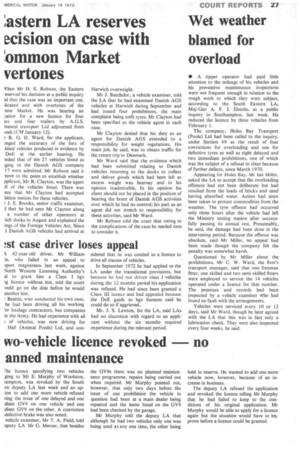Wet weather blamed for overload
Page 29

If you've noticed an error in this article please click here to report it so we can fix it.
• A tipper operator had paid little attention to the mileage of his vehicles and his preventive maintenance inspections were not frequent enough in relation to the rough work to which they were subject, according to the South Eastern LA, Maj-Gen A. F. J. Elmslie, at a public inquiry in Southampton, last week. He reduced the licence by three vehicles from February 1.
The company, Holes Bay Transport (Poole) Ltd had been called to the inquiry, under Section 69 as the result of four convictions for overloading and one for defective tyres as well as eight delayed and two immediate prohibitions, one of which was the subject of a refusal to clear because of further defects, since March 1970.
Appearing for Holes Bay, Mr Ian Miller, asked the LA to accept that the overloading offences had not been deliberate but had resulted from the loads of bricks and sand having absorbed water. Action had since been taken to protect commodities from the weather. The tyre offence had occurred only three hours after the vehicle had left the Ministry testing station after successfully passing its annual test. Presumably, he said, the damage had been done in the intervening period. Because the offence was absolute, said Mr Miller, no appeal had been made though the company felt the penalty was somewhat harsh.
Questioned by Mr Miller about the prohibitions, Mr C. W. Ward, the firm's transport manager, said that one foreman fitter, one skilled and two semi-skilled fitters were employed to service the 14 vehicles operated under a licence for that number. The premises and records had been inspected by a vehicle examiner Who had found no fault with the arrangements.
Vehicles were serviced every 10 or 12 days, said Mr Ward, though he later agreed with the LA that this was in fact only a lubrication check. They were also inspected every four weeks, he said.




















































































































